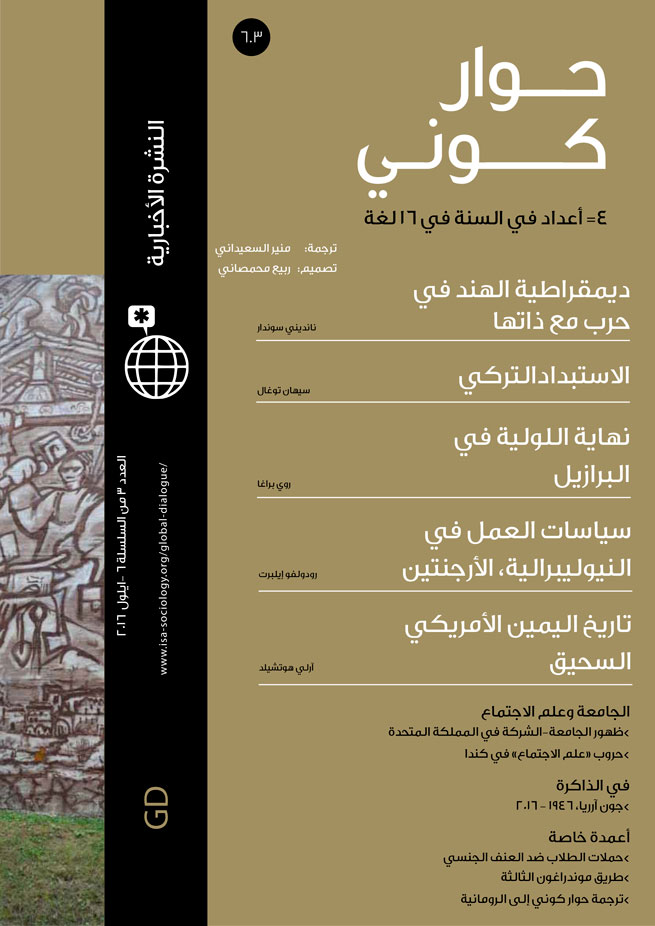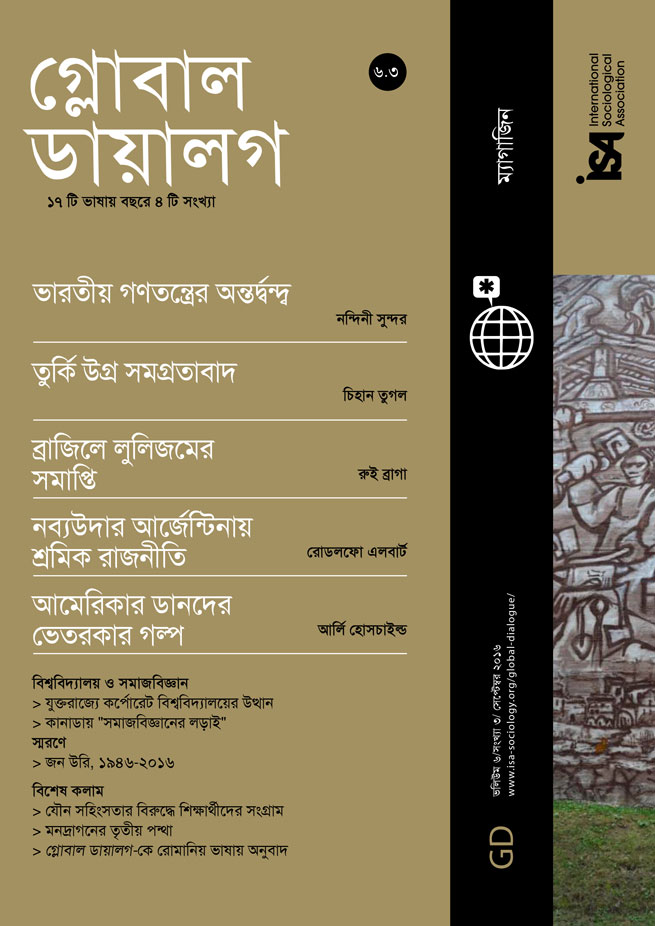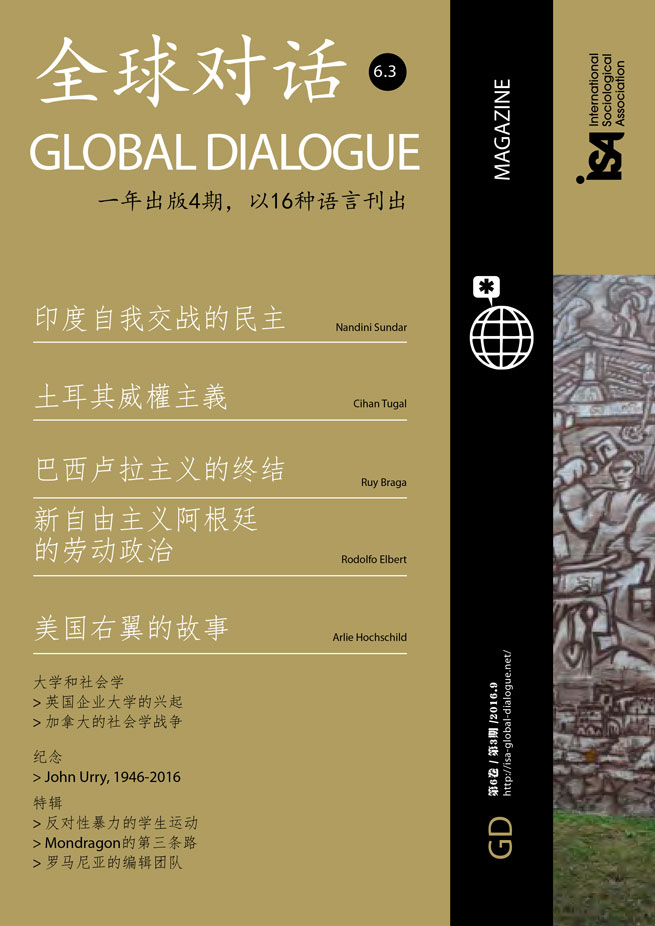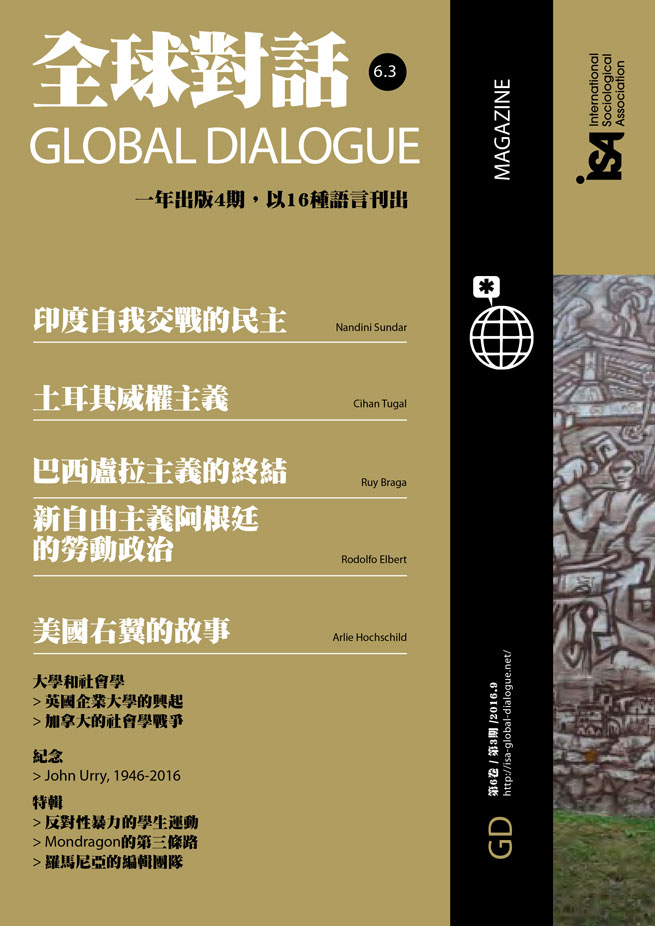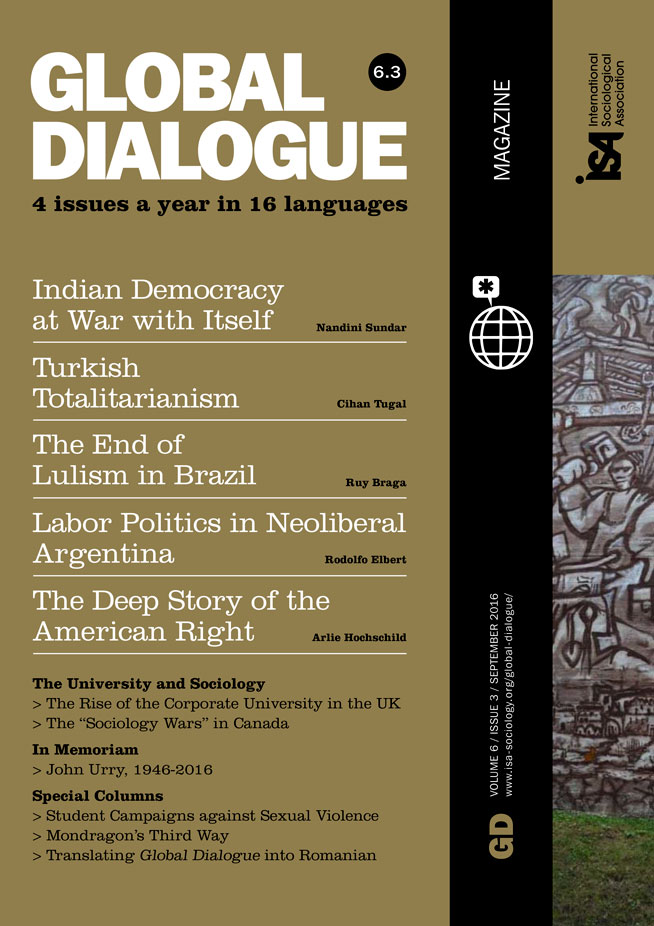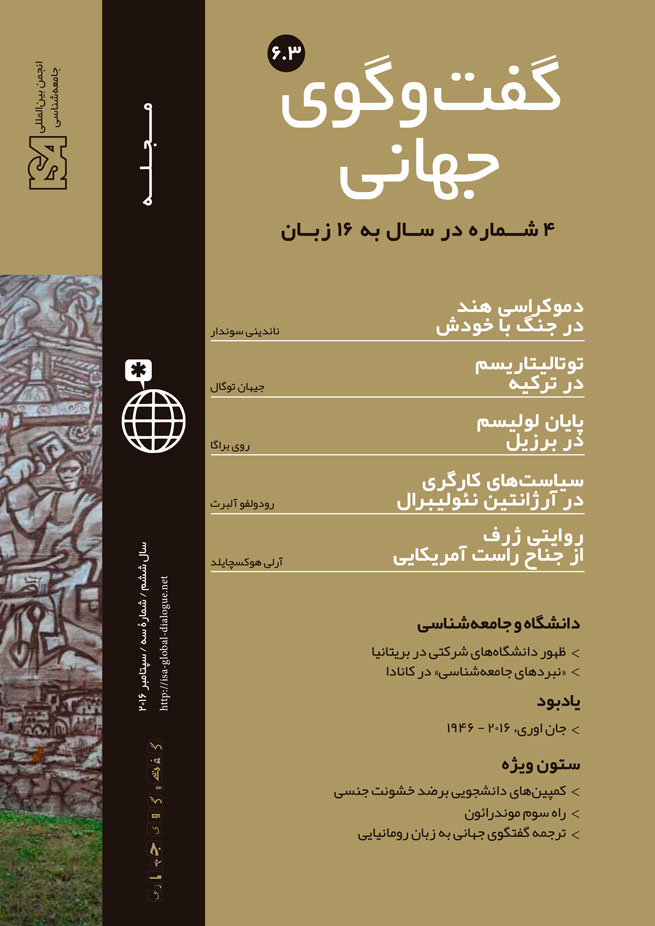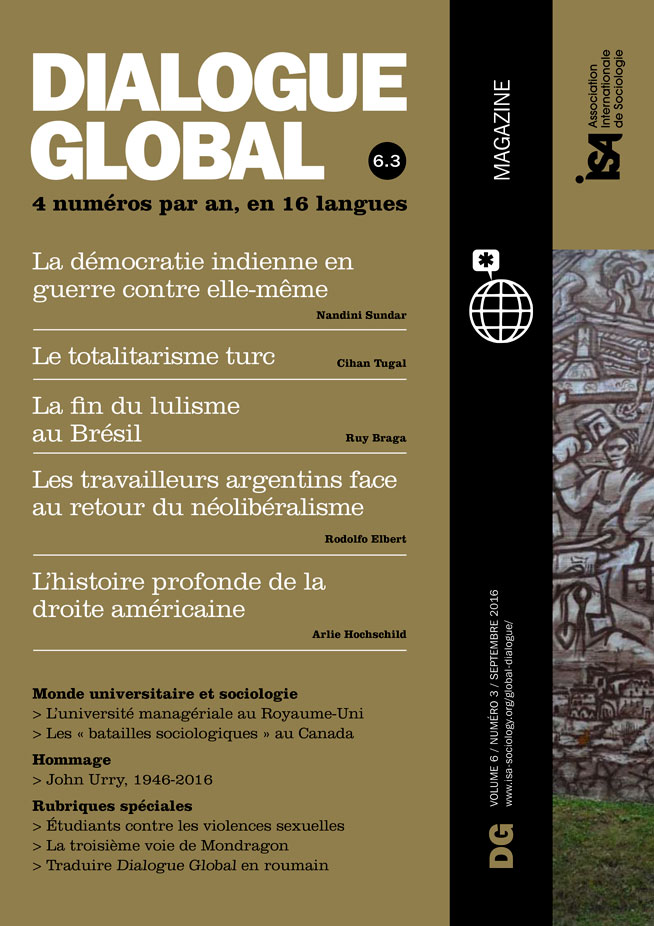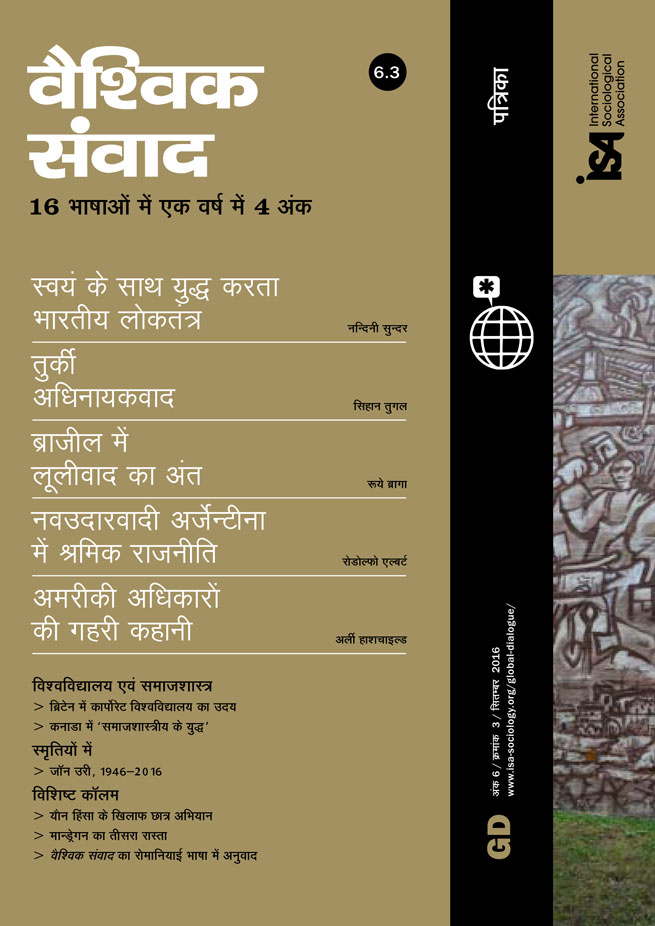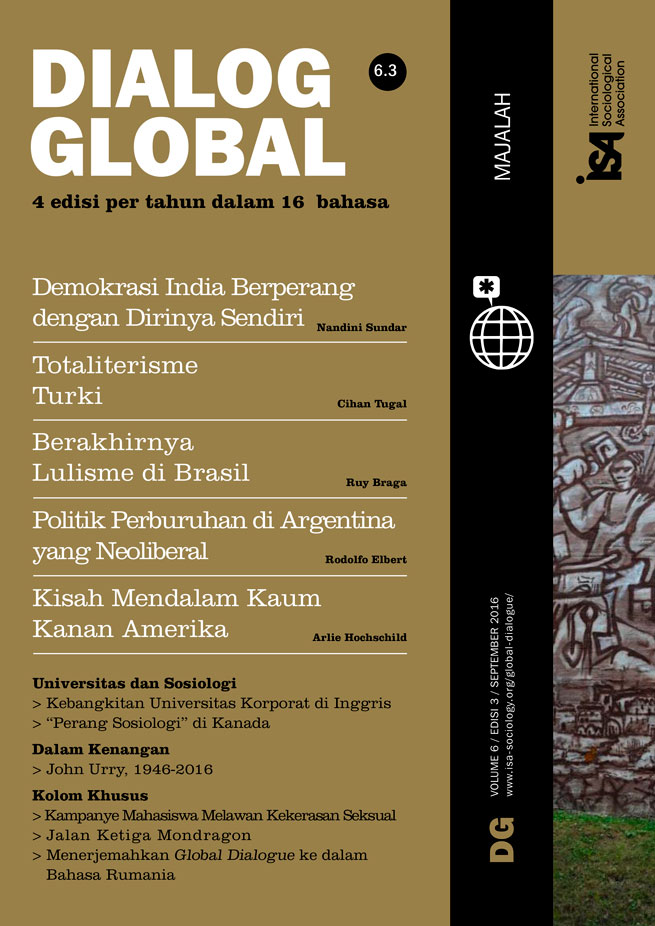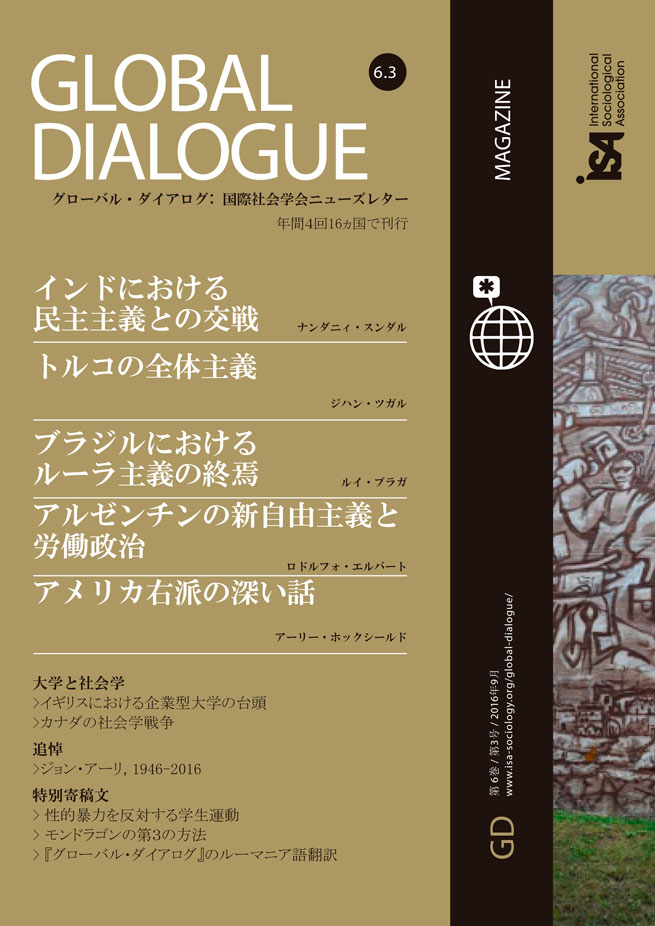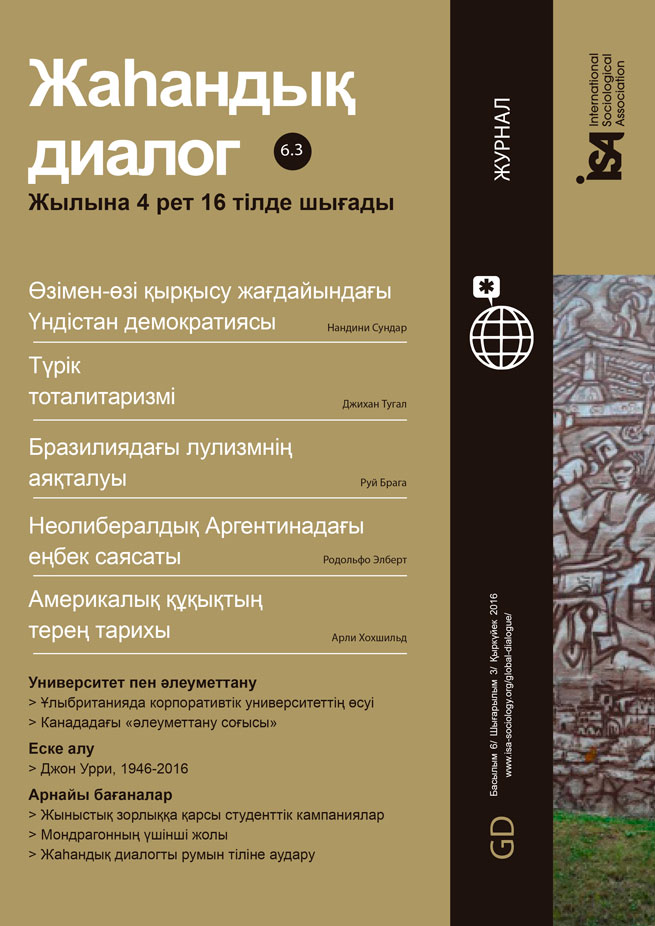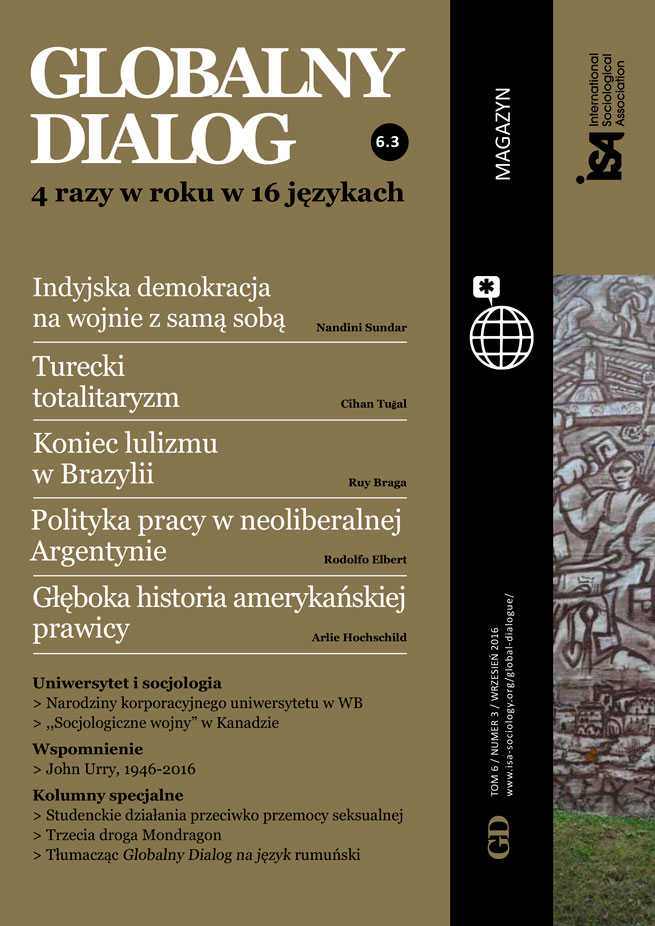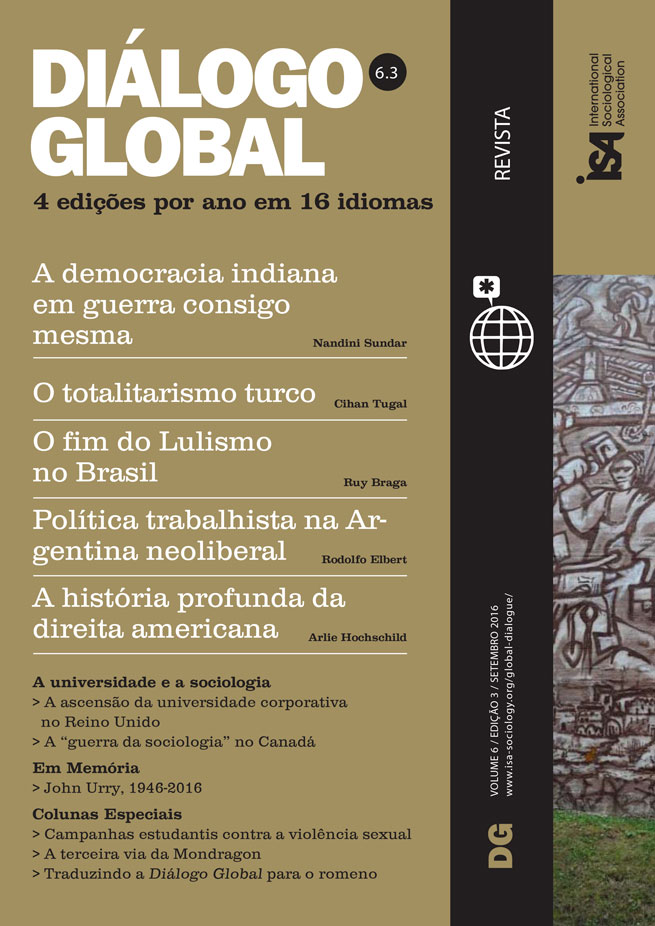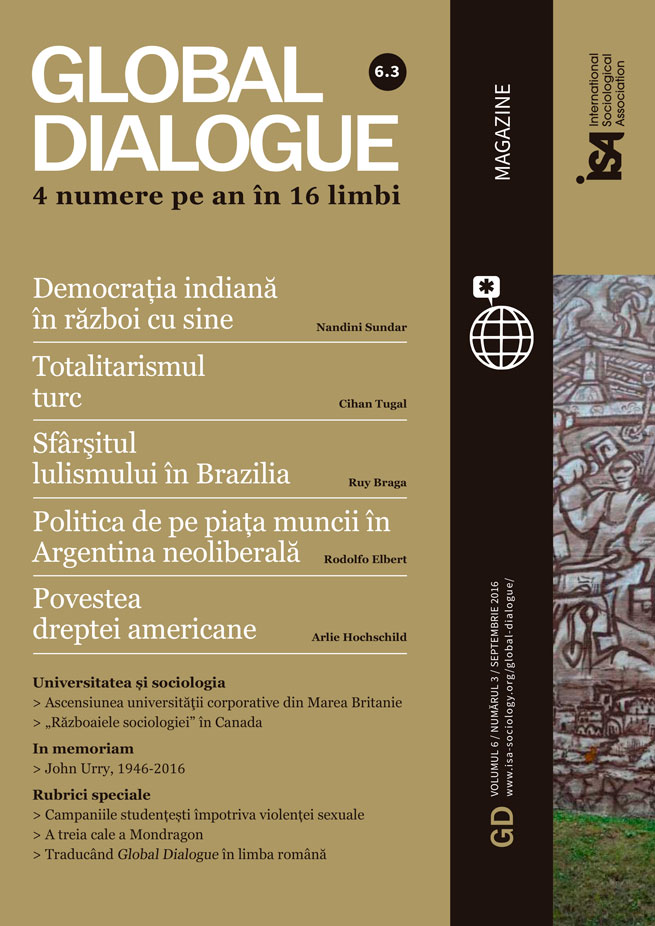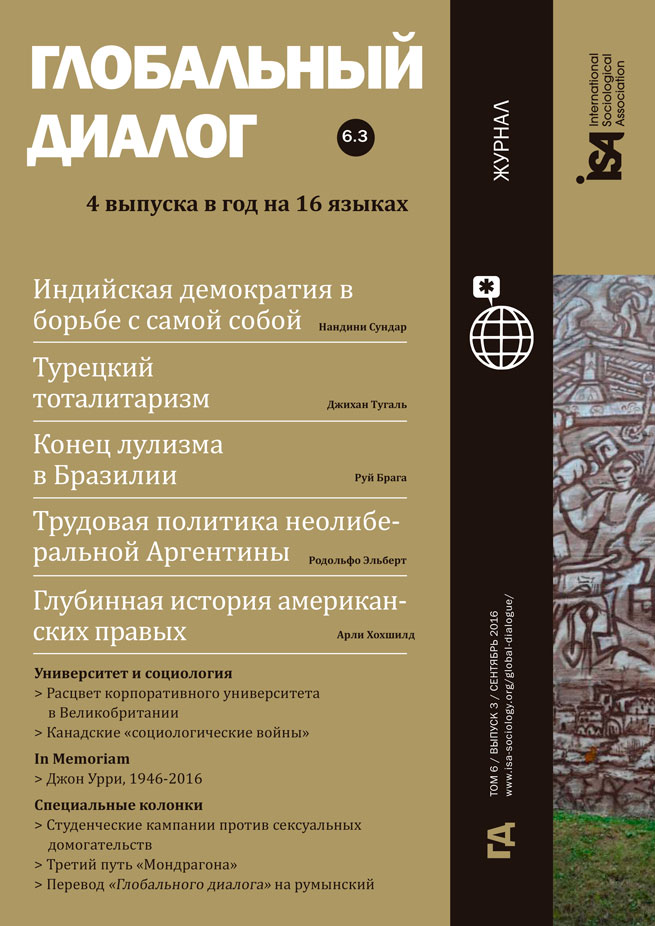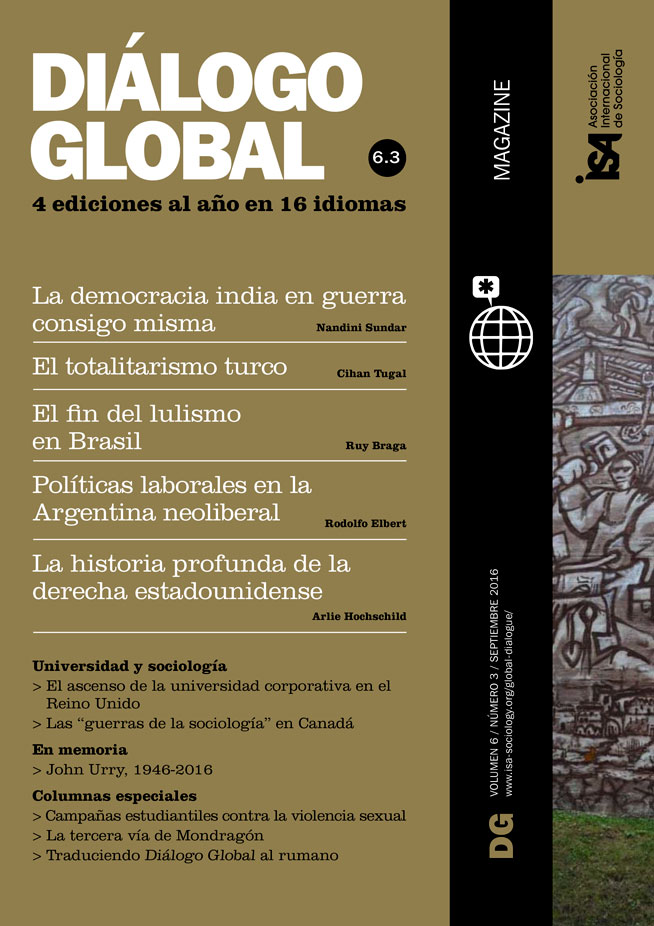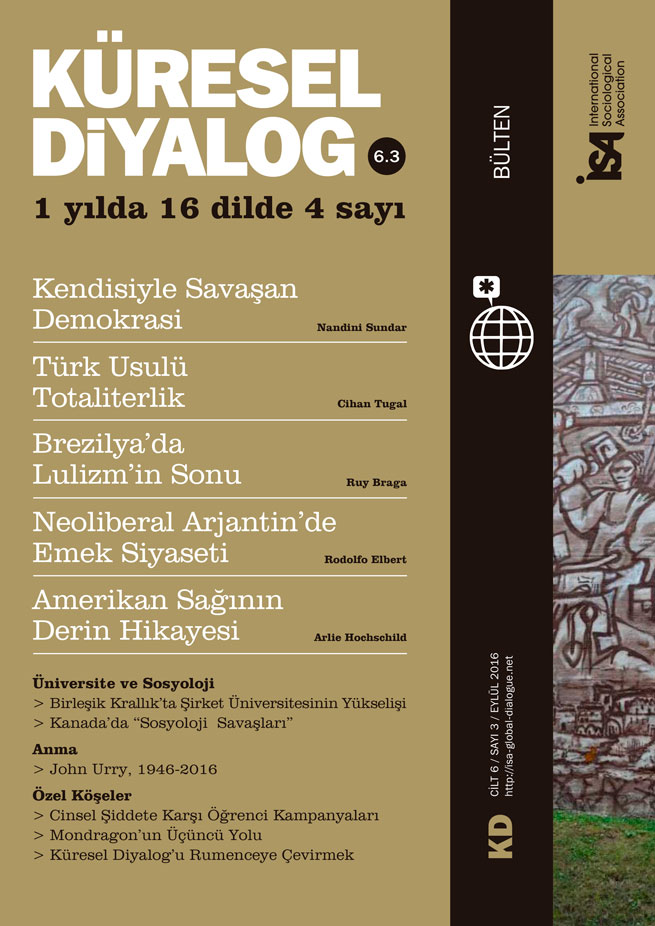Read more about The University and Sociology

The Rise of the Corporate University in the UK
by Huw Beynon
August 06, 2016
At the turn of the 21st century, several senior scholars sounded alarm bells about the state of Canadian sociology. Bruce Curtis and Lorna Weir argued that English Canadian sociology suffered from “a weak sense of sociology as a craft with distinctive knowledges, skills, and a public vocation”; they worried about the discipline’s future, as Canada’s founding sociologists neared retirement.[1] Robert Brym posed concerns about declining membership in the Canadian Sociological Association, raising worries about the general health of the discipline in Canada.[2] Neil McLaughlin responded by exploring some wider institutional factors, warning of a “coming crisis” in Canadian Sociology,[3] hoping to generate a reflexive moment, beginning a dialogue that might promote wiser institutional strategies and a broader intellectual vision. The often emotional and polemical barrage of responses to these articles initiated what we call the “sociology wars” in Canada, which still rage on a decade later.
Pat O’Mally and Alan Hunt provided some opening volleys, arguing that Curtis and Weir’s worries about a weakening discipline were tantamount to a “witch hunt,” setting up stringent disciplinary standards in order to police sociologists who might step out of line.[4] McLaughlin’s “crisis” article spurred on another set of critical responses, challenging him on both normative and empirical grounds.[5] While much of this debate helped contextualize the realities of Canadian sociology, its tenor was often harsh. As Canadian sociologists prepare to host the International Sociological Association (ISA) World Congress in Toronto in 2018, we reflect on some of the core concerns raised, hoping to highlight some issues that may be relevant and useful to other national sociologies, especially those outside the United States.
Much concern about the state of Canadian sociology focused on the declining membership and meeting attendance of our national association. Annual English-language Canadian sociology meetings are held as part of an interdisciplinary Congress of the Social Sciences and Humanities, organized at various universities around the country. Canadian sociology meetings suffered from low attendance, especially among the top sociology faculty. Was this a sign of disciplinary decline? Jean-Philippe Warren reminded us that many other national and global scholarly associations faced similar declines.[6] Building on Robert Putnam’s “bowling alone” thesis, he suggested that the rise of internet communication technology enabled informal scholarly networking over wide geographical distances, so that scholars could “sociologize alone,” outside of traditional, formally organized meetings.
Yet there were other signs of weakness in the early 2000s, as sociology continued to have low status both in the university and in society more generally. Many of these issues remain relevant today, and are probably common to other national sociologies, but they play out in particular ways in Canada, because of our unique history, and our different relationships with the United States, Britain and France.
Worries of American scholarly hegemony led to a Canadianization movement in the 1970s and 1980s, as sociologists sought to create a more autonomous Canadian sociology, through increased Canadian content and domestically-trained hires. However, this same movement undoubtedly intensified negative sentiments against American sociology, including a certain smugness that allows us to bash America and ignore our own flaws.[7]
Still, there is reason to worry about the weakening of our own national content, an issue undoubtedly faced by sociologists in many other countries as well. Canadian sociologists are increasingly likely to receive training from the USA, and to turn away from building on Canadian exemplars such as John Porter or Wallace Clement in favor of more globally known theorists.[8] What used to be a unique Canadian tradition is increasingly becoming diluted into just another participant in the global (read: American and Eurocentric) discipline.
Ralph Mathews has made an effort to re-establish a more uniquely Canadian tradition by reincarnating the “staples theory” of Harold Innis,[9] an important early theorist of Canadian society who argued that the geographical development of Canada’s cities was closely tied to trade routes for our natural resource economy, creating widely different geographic regions with diverse cultural imprints. Extending this frame with newer contemporary concerns about the fossil fuel industry, protections for our natural environment, and First Nations rights, we gain insight into how we are unique, both as a nation and sociological tradition. Yet what may seem “unique” to Canada might also serve as valuable points of comparison to other countries that face the same globalizing forces as they interact with local context and issues.
As a relatively new discipline that only became fully institutionalized in the 1960s and 1970s, Canadian sociology was marked by a particularly Marxist-inspired radicalism, since most major hires took place in a time of social and political conflict. This intensely “critical” orientation in our discipline is still dominant today, leading to much policy and political engagement, much to the chagrin of conservative politicians. For example, in dismissing calls for more research into the root causes of terrorism in order to better prevent it, Canada’s conservative former Prime Minister Stephen Harper infamously claimed that “this is not a time to commit sociology.” For Canadian sociologists, this statement challenged the value of sociological research, leading the Canadian Sociological Association to start selling “Commit Sociology” T-shirts in 2015 as a sort of rallying cry.
This longstanding critical element in Canadian sociology created a receptive audience for Michael Burawoy’s call for public sociology.[10] A number of Canadian sociologists chimed in to support him, or to claim that Burawoy did not go far enough in pushing for publicly-oriented research.[11] Some Canadians rejected the very idea of public sociology, emphasizing the importance of a professional core. Scott Davies asked for a “disciplinary divorce” once and for all, between what he saw as proper social scientists on the one hand, and dogmatic critical theorists on the other.[12] Canadian feminists argued that Burawoy’s call neglected potential private and state-sponsored partnerships that might help us work with publics to solve important social issues.[13]
And indeed, as we turn from the Harper government’s highly conservative agenda to Justin Trudeau’s liberalism, the potential for increased federal action to tackle public issues – especially those affecting First Nations peoples – is evident. Sociologists can look forward to a robust public sociology in Canada, one that remains in critical partnership and ongoing dialogue with the state.
As the sociology wars continue today, early worries about the status of the discipline remain at the forefront. William Carroll recently argued that along with all other disciplines in social science, sociology should give way to a transdisciplinary nexus united by critical realism.[14] The fact that this paper received the Canadian Review of Sociology’s best article award in 2015 reflects underlying cultural currents, as many sociologists in Canada prefer to reject their disciplinary identity and commitments.
This poses a serious obstacle for those who seek a relatively open form of scholarship, but who are not willing to trade away disciplinary advantages. Many would argue that the best recent scholarship shatters popular claims that disciplines act only as intellectual silos: disciplines actually share knowledge with remarkable efficiency.[15] Still, the tired rhetoric of disciplines as silos, there only to “police” intellectuals, seems to die hard.[16] And while disciplines can indeed serve to stifle knowledge production, we cannot ignore evidence suggesting that, on balance, they do much to enhance it. Rather than forcing a choice between insular disciplines (which is exaggerated) and total transdisciplinarity (which is utopian), perhaps it would be best to work in between these ideals, recognizing tradeoffs and avoiding the disadvantages of either extreme.[17]
While reflections on the discipline can be useful, they can also degenerate into rhetorical and ideologically-driven arguments, distracting from the more important task of “committing” actual empirical sociology. But a body of scholarship provides empirical and historical insights into the texture of Canadian sociology. Rick Helmes-Hayes recently documented the roots of Canadian sociology within early 20th century theology,[18] and Bruce Curtis has gone back even further, linking the development of social science to 19th century “state building”.[19] New quantitative studies document the changing patterns of our foreign and domestic hiring practices, and of our work,[20] illustrating our wonderful epistemological diversity[21] and how our theoretical schools of thought change over time. Over the past decade, there seems to be a theoretical convergence around the work of Pierre Bourdieu, a theorist and researcher who helps build bridges between our English and French speaking wings.[22] As we look to the future, empirically grounded debates are welcome as a “sociology of sociology,” making for less narcissistic, and more empirically grounded, forms of institutional reflexivity.
While the Canadian “sociology wars” have been contentious, and resulted in a few bruised egos, on the whole they have been constructive. Established scholars have re-entered the fold, helping to socialize a new generation of sociologists into a positive vision. Attendance at our meetings has risen, stimulated by the creation of research clusters inspired, in part, by the ISA. There are more French language sessions at our meetings, and the Canadian Review of Sociology’s editor, Dr. François Dépelteau, is a Francophone. The association can boast a revived feminist sociology, largely inspired by Dorothy Smith and Canadian socialist-feminists. Further, a new research agenda stressing de-colonization and reconciliation with indigenous First Nations people spans a number of issues where public sociologists are relevant and needed.
The Canadian Sociological Association looks forward to welcoming sociologists from across the globe to the ISA World Congress in Toronto, in 2018. We look forward to furthering a dialogue about how to best understand and reflect on our diverse national sociologies, by learning from each other within a wider comparative context.
[1] Curtis, B. and Weir, L. (2002) “The Succession Question in English Canadian Sociology.” Society/Société, 26, 3.
[2] Brym, R. (2003) “The Decline of the Canadian Sociology and Anthropology Association.” Canadian Journal of Sociology, 28(3): 411-416.
[3] McLaughlin, N. (2005) “Canada’s Impossible Science: Historical and Institutional Origins of the Coming Crisis in Anglo-Canadian Sociology.” Canadian Journal of Sociology, 30(1): 1-40.
[4] O’Malley, P. and Hunt, A. (2013) “Does Sociology Need to be Disciplined?” Society/Société, 27(1).
[5] See volumes 30(4) and 31(1) in the Canadian Journal of Sociology for the main comments on McLaughlin’s “crisis” article, and his reply (2005-06).
[6] Warren, J-P (2006) “Sociologizing Alone? Is Anglo-Canadian Sociology really Facing a Crisis?” Canadian Journal of Sociology, 31(3): 91-105.
[7] Cormier, J. (2002) “Nationalism, Activism, and Canadian Sociology.” The American Sociologist, 33(1): 12-41.
[8] Warren, J-P (2014) “The end of National Sociological Traditions? The Fates of Sociology in English Canada and French Quebec in a Globalized Field of Science.” International Journal of Canadian Studies, 50: 87-108.
[9] Mathews, R. (2014) “Committing Canadian Sociology: Developing a Canadian Sociology and a Sociology of Canada.” Canadian Review of Sociology, 51(2): 107-127.
[10] Burawoy, M. (2005) “2004 Presidential Address: For Public Sociology.” American Sociological Review, 70: 4-28.
[11] See a special issue on this, edited by Rick Helmes-Hayes, and Neil McLaughlin (2009) “Public Sociology in Canada: Debates, Research, and Historical Context.” Canadian Journal of Sociology, 34(3): 573-600.
[12] Davies, S. (2009) “Drifting Apart? The Institutional Dynamics awaiting Public Sociology in Canada.” Canadian Journal of Sociology, 34(3): 623-654.
[13] Creese, G., McLaren, A. and Pulkingham, J. (2009) “Re-thinking Burawoy: Reflections from Canadian Feminist Sociology.” Canadian Journal of Sociology, 34(3): 601-622.
[14] Carroll, W. (2013)“Discipline, Field, Nexus: Re-visioning Sociology.” Canadian Review of Sociology, 50(1): 1-26.
[15] Jacobs, J. (2013) In Defense of Disciplines. Chicago, IL: University of Chicago Press.
[16] Curtis, B. (2016) “The Missing Memory of Canadian Sociology: Reflexive Government and the Social Science.” Canadian Review of Sociology, 53(2): 203-225.
[17] Puddephatt, A. and McLaughlin, N. (2015) “Critical Nexus or Pluralist Discipline? Institutional Ambivalence and the Future of Canadian Sociology.” Canadian Review of Sociology, 52(3): 310-332.
[18] Helmes-Hayes, R. (2016) “Building the New Jerusalem in Canada’s Green and Pleasant Land: The Social Gospel and the Roots of English-Language Academic Sociology in Canada, 1889-1921.” Canadian Journal of Sociology, 41(1): 1-52.
[19] Curtis, B. (2016), ibid.
[20] Warren, J-P (2014), ibid.
[21] See Joseph Michalski, “The Epistemological Diversity of Canadian Sociology.” Forthcoming in Canadian Journal of Sociology.
[22] Stokes, A. and McLevey, J. (2016) “From Porter to Bourdieu: The Evolving Specialist Structure of English Canadian Sociology.” Canadian Review of Sociology, 53(2): 176-202.
Neil McLaughlin, McMaster University, Canada <ngmclaughlin@gmail.com>
Antony Puddephatt, Lakehead University, Canada
This issue is not available yet in this language.
Request to be notified when the issue is available in your language.
If you prefer, you can access previous issues available in your language:
